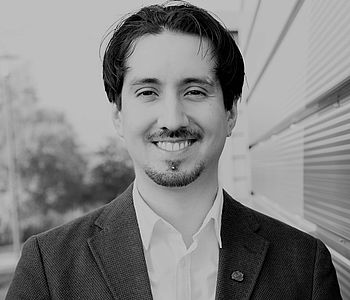Alejandro Valdivia | Doctorant associé

Institution principale
:
Europa-Universität Flensburg
|
Position
:
Chercheur associé
|
Discipline
:
Sciences sociales
|
Biographie
Alejandro Valdivia est sociologue en relations internationales, avec un parcours académique transnational couvrant plusieurs langues et systèmes éducatifs. Ses recherches portent sur les humanités médicales, la migration et les droits sociaux dans l’UE, en particulier en ce qui concerne la santé et le travail. En tant que chercheur associé et doctorant à l’Université européenne de Flensburg (ICES) et à l’Université Humboldt de Berlin (CMB), il travaille sur l’accès aux droits sociaux pour les femmes et les migrant·e·s en France et en Allemagne. Alejandro est également impliqué dans l’Alliance européenne des universités Circle U. À ce titre, il est chercheur invité à l’Université d’Oslo, en Norvège, où il explore les enjeux de responsabilité en santé globale, en collaboration avec des professeur·e·s de l’Université de Pise (Italie), de l’UCLouvain (Belgique) et de l’Université Paris Cité (France). Au sein du Circle U., il a également obtenu un financement pour un projet portant sur la santé au travail et les inégalités sociales au sein de l’UE. Sa thèse doctorale explore l’interface entre connaissance et politique dans le champ féministe des Science and Technology Studies (STS), avec un focus empirique sur la régulation de la santé au travail dans les abattoirs allemands et le rôle des syndicats. Alejandro est titulaire d’un master en relations internationales, avec des spécialisations en droit international et politique internationale de l’Université technique de Dresde en Allemagne (en allemand et anglais), d’une licence en sociologie de l’Université de Strasbourg en France (en français), et d’un diplôme en sciences humaines classiques de l’Université jésuite Antonio Ruiz de Montoya au Pérou (en espagnol).
Sujet de recherche
Feminist Science and Technology Studies (STS); Medical humanities, Evidence-based policy (EBP); Global health; Precarity; Trade unions; Slaughterhouses; Migration.
Titre de la thèse
From Knowledge to Policy: Occupational Health Precarity in Industrial Slaughterhouses in GermanyRésumé de la thèse
Ma thèse doctorale, rédigée sous forme d’articles, étudie la relation entre connaissance et politique. Elle s’appuie sur une étude de cas portant sur la régulation de la santé au travail dans les abattoirs allemands durant la pandémie de COVID-19. Plus précisément, je me concentre sur le rôle des syndicats dans l’élaboration et la mise en œuvre de ces politiques de santé. Pour cela, je mobilise un dialogue interdisciplinaire entre les humanités médicales, les études féministes des sciences et technologies (STS) et les sciences juridiques. Cette approche me permet d’analyser les logiques, les dynamiques et les défis liés à la production et à la transmission des connaissances dans des contextes de précarité structurelle. Au-delà de l’étude de cas spécifique des abattoirs, l’objectif principal de ma recherche est d’explorer de manière critique comment les populations marginalisées de façon intersectionnelle peuvent produire et utiliser efficacement les connaissances afin de parvenir à une participation démocratique.
Dans mon premier article (Occupational Health in Slaughterhouses in Germany: Translating Political Claims into Legal Language During the COVID-19 Pandemic), j’examine comment les revendications politiques en matière de réglementation de la santé au travail dans les abattoirs ont été traduites en langage juridique, en mettant l’accent sur le rôle de la traduction des savoirs comme concept herméneutique pour analyser la transformation sociale. Dans mon deuxième article (Precarity-Based Evidence: Trade Unions’ Knowledge Production on Migrant Workers’ Occupational Health in Slaughterhouses in Germany), j’analyse comment la précarité structurelle impose une production de savoirs très instrumentale, fragmentée et non systématique, que je conceptualise comme « precarity-Based Evidence (PBE) ». Mon troisième et dernier article (titre provisoire : The Known Unknowns of Precarity: Navigating Uncertainty in Occupational Health in Slaughterhouses in Germany) analyse l’incertitude comme un aspect central de la PBE. L’objectif de cet article est de créer un cadre permettant à la société civile de gérer l’incertitude dans le contexte des profondes crises socio-écologiques.
Directeur de thèse
L’accès aux droits sociaux en France et en Allemagne : inégalités et discriminations, genre et migrations dans les jeux d’échelles de l’espace européen (ACCESS plus)
Publications
Alejandro Valdivia (2025) Precarity-Based Evidence: Trade Unions’ Knowledge Production on Migrant Workers’ Occupational Health in Slaughterhouses in Germany, Zeitschrift für Politik. doi: https://doi.org/10.5771/9783748949398-117
Sandy Tubeuf, Alejandro Valdivia, Lara Tavoschi, Jean-Philippe Empana, Eivind Engebretsen (2025) The responsibility of health: shifting the focus from individuals to systems, The Lancet. doi: https://doi.org/10.1016/S2468-2667(25)00013-1
Alejandro Valdivia, Johannes Gallon, Anna Katharina Mangold (2023) Occupational health in slaughterhouses in Germany: translating political claims into legal language during the COVID-19 pandemic, Zeitschrift für Sozialreform. doi: https://doi.org/10.1515/zsr-2023-0005
Sandy Tubeuf, Josephine Aikpitanyi, Omar Deraz, Jean-Philippe Empana, Zoulikha Faraj, Christoph Gradmann, Bojana Matejic, Amaury Peeters, Matthew Prina, Torben Sigsgaard, Lara Tavoschi, Alejandro Valdivia, Christian Morberg Wesje, Pascal Grosse. Global Health in Higher Education: New Perspectives from a trans-European University Alliance, The Lancet (under review)
Ruben Della Pia, Alejandro Valdivia, Francesca Grasso, Maria-Christine Mautner, Andres Salazar, Alexia Bigorne. Occupational Safety and Health in the European Union: A Multifaceted Challenge Requiring Interdisciplinary Research (manuscript for submission to The Lancet)